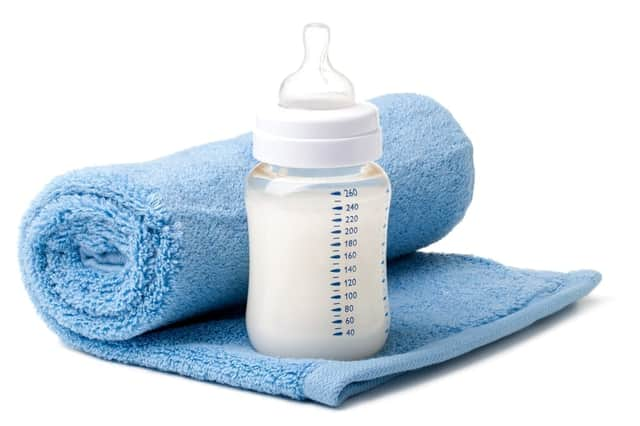Baby bottle propping - what is it, and why is it so dangerous?
This article contains affiliate links. We may earn a small commission on items purchased through this article, but that does not affect our editorial judgement.


Bottle propping is a dangerous practice that goes back years. But it is now receiving increased attention as society tries to sell a “solution” for everything.
Feeding a baby with a bottle resting upright against something allows the milk to flow without the need for parental hands. And over the last few years, numerous devices that essentially make feeding a baby a hands free (human free?) activity have flooded the market. Promoted as enabling parents to get a break from the proposed monotony of caring for a baby, they sell a solution to a deeply ingrained but skirted around societal issue – that we simply do not value or care for new mothers.


Advertisement
Hide AdAdvertisement
Hide AdTragically, bottle propping can be fatal. Young babies may not have the head control or strength to move away from the flow of the milk that is being aided by gravity. Quite simply they can choke to death as they cannot escape from the milk, or inhale it as the bottle becomes displaced.
There is also the very real risk that babies simply end up consuming too much milk if it keeps flowing. Research has shown how babies take more milk from a bottle than they do when they breastfeed (one reason why bottle fed babies can be at a higher risk of being overweight) and this increases if they are encouraged to take more – as a propped bottle would “encourage” them to do.
Yes, an older baby might be able to move their head away, but at what stage? When they’ve had enough? Or when they really can’t stand any more? Small extra amounts of milk every day matter. Those few extra calories can turn into extra kilos over the months. And encouraging a baby to keep feeding when they are full can also interfere with their ability to control their appetite later on.
Then there is the inescapable fact that having a bottle propped into your mouth when you can’t remove it can’t be the nicest feeding experience. Feeding is about so much more than nutrition. Holding a baby warm and close while being fed is a big part of them feeling secure and loved. It’s no coincidence that the sight range of newborn babies is pretty much perfect to reach their parents eyes at the angle that they would be held for a feed. Skin to skin contact is ideal when possible during feeds, but just the fact that the baby is being fed by a human being increases oxytocin, helping calm them and create general all round lovely feelings.


Advertisement
Hide AdAdvertisement
Hide AdAnd no, you don’t need to stare endlessly into a baby’s eyes at every feed, but there is a vast gulf between that and not even holding a baby.
Hungry but happy.MJTH/Shutterstock
But my real question is: how did we get to a stage where these devices are needed? You can understand their appeal. We now have so many parents who are pretty much doing this on their own. Yes, they might have a partner, but they’re often at work all day. Yes, they might have visitors, but how many are there just to coo over the baby rather than do anything useful such as cook a meal, do the washing up, or anything else that might actually help a new mother feel more relaxed? Rates of postnatal depression are soaring. So many new mothers feel isolated and alone. The stress and sheer exhaustion of trying to manage everything on your own, day after day, can be overwhelming.
How on earth have we got to the point where bottle propping is the solution? Why are we ignoring the needs of our new mothers? Why are new mothers literally the ones left holding the baby, day in, day out? Having a new baby is always going to be a huge change. But it doesn’t need to be like this.
There needs to be proper postnatal support for new mothers. Professionals who are given the time and the training to identify issues and advise on options. We need partners to have extended, well-paid leave (and indeed in places such as the US, even giving mothers this proper extended well-paid leave would be a start).
Advertisement
Hide AdAdvertisement
Hide AdThere need to be support networks. No mother should be doing this alone. We should track down where the “village” – that extended network of family and friends which share responsibility for raising a child – went to and recreate it. There must be a recognition of how isolating and exhausting caring for a baby can be – and a system in place to catch mothers before they fall.
We need to mother our new mothers, so that mothering with your sanity intact isn’t an insurmountable challenge.
And finally, these devices should be recognised for what they represent – a breaking point, a plea for help. Governments must put their money where their mouths are and invest in repairing and supporting a future that is balancing on the edge of being truly broken.
Amy Brown, Professor of Child Public Health, Swansea University
This article was originally published on The Conversation. Read the original article.